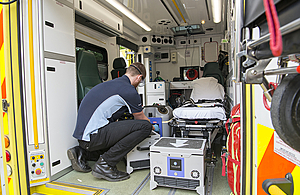Defence scientists trial innovation to slash ambulance cleaning time
DASA and Dstl complete rapid coronavirus support work in just 33 days after appeal saw hundreds of responses from industry

DASA and Dstl working with the Welsh Ambulance Service. MOD Crown Copyright.
Trials of novel technology that could dramatically cut the time it takes to decontaminate ambulances have taken place following a rapid appeal by the Defence and Security Accelerator (DASA) in response to Coronavirus.
Scientists at the Defence Science and Technology Laboratory (Dstl) have tested 12 methods to speed-up the sanitising of ambulances – in some cases reducing cleaning time from an hour to around 10 minutes so more lives can be saved.
How to watch this YouTube video There's a YouTube video on this page. You can't access it because of your cookie settings. You can change your cookie settings or watch the video on YouTube instead: DASA coronavirus response
More than 200 ideas were submitted to DASA by industry in just seven days following the appeal, which was launched on behalf of the Welsh Ambulance Service, Welsh Government, The Small Business Research Initiative (SBRI) Centre of Excellence, and Innovate UK.
Gabriella Cox, DASA security competition lead, said:
This has been a huge effort from everyone involved. The response by industry was remarkable and there has been a monumental effort by staff from DASA, Dstl and our partners to be able to complete this project in just 33 days.
Innovation has never been more important as we play our part in the national effort against Coronavirus.
Dstl scientist Steve Mitchell, who led the trials, said:
The trials have shown some really promising ideas ranging from fogging techniques, sprays, and using a decontaminant vapour to give a thorough and deep clean in the quickest time possible.
This has been a big challenge for everyone involved to turn this work around in such rapid time with the possibility of one of the solutions being taken forward by the Welsh Ambulance Service in the next week or so.
How to watch this YouTube video There's a YouTube video on this page. You can't access it because of your cookie settings. You can change your cookie settings or watch the video on YouTube instead: Steve Mitchell interview
It is hoped the solutions may also be used by other emergency services and possibly public transport.
The Welsh Ambulance Trust will consider results from the trials and successful solutions may be implemented across the organisation.
DASA finds and funds innovation for the UK’s defence and national security.